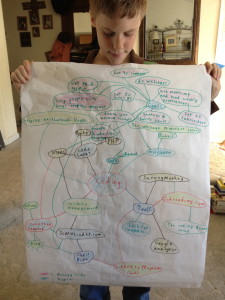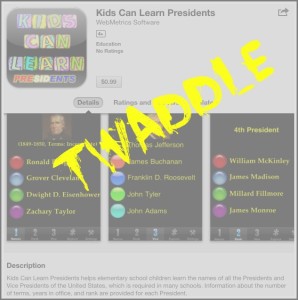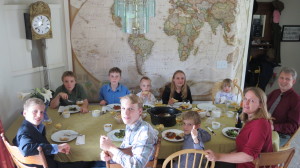Agree for your children to learn useless facts, but only those that have strategic value that will help keep the social peace within your immediate environment. Do you really need to memorize all the county seat names of your State or country? Probably not, but maybe your old great-grandpa Herman who lives with you is insistent that your children will grow up to be barbarians without a chance to make it in life unless they do. He’s not on the Internet, but he still remembers WWII and that back then they had to memorize that list in boot camp and that proves that it was that kind of toughness that saved civilization. You can waste time on that list, but only because it has strategic value to keep a critical peace – the rest of the stuff is SPAM and you must ruthlessly spend time cutting out the twaddle if your children are going to become great in their talent.
Month: April 2013
Talent Progress Creates Family Buzz at the Dinner Table
At the dinner table I will sometimes recap to my wife out loud what I am excited about in my child’s talent development. I will then ask my child to speak up and add some clarifying details as to how this milestone came about. I remember one particular week where my 11 year old got several personal notes from professional programmers who commended him on his progress as they could see through his blog and online forum participation. This feedback created a real buzz of excitement as the very next day there was a renewed sense of purpose among the rest of the older children to wake up early to research and blog for their next post on their respective talent development.
Walk in Order to Think
I was reminded today by The Art of Manliness how beneficial walking has been for my wife and me. Come to think of it, walking for thinking or inspiration is now also becoming a habit of my two oldest boys who are now 15 and 13 years of age. They are mimicking their parents who, they notice, go on walks in order to get away from the computer, to get a dose of wonderful light, and to get the blood flowing and come back cheerful. After walking, many a previously difficult situation seems to have been resolved with a solution that comes to mind that was invisible before. We just ask that they come back home by a specific time and to let us know their general whereabouts in case of an emergency.
Children Bond Through Exercising Talents
Your child will find joy with his family by using his beginning skill and talent in a way that brings value, even a small value, to one of his siblings. Do you remember how much bonding and admiration power there was, for example, when your oldest child used to read to his younger brother in order to soothe him? You can repeat that same strategy between teenage children as they use their serious talents to learn how to serve the needs of their brothers and sisters who are respectively growing in their own talents. An older sibling who has a core baking skill of a couple thousand of hours behind him, for example as part of a larger developing talent, can also use it to boost the silversmithing club activities of the status his brother through amazing food and hospitality. Another sibling who has developing computer skills can work on upgrading his sister’s online art portfolio and said sister can in turn work on digital logos and ad graphics for all the other sibling blog postings.
MindMap Helps Uncover Talent Opportunities

Use the MindMap technique to help you uncover new skills that could add to your child’s growing talent. Remember that a talent, in order for it to be useful enough to other people, should continue to evolve with an eye to adapting to new learning opportunities and to developing growing market value. The MindMap starts with a large piece of butcher paper, some colored felt pens, and a list of keywords or phrases that describes the current state of your child’s talent. You then connect the keywords to new words representing new ideas and thoughts; enhance with doodles if you like. It is in the process of connecting with old and new that your mind will uncover new talent development possibilities that you had not seen before.
Fishbone Uncovers Workaround to Problem

Is there a particular problem blocking your child’s talent development to the next level? Use the fishbone diagramming technique to help you uncover other things your child can do so that the problem is no longer a problem. On a blank piece of paper, diagram with a pencil the schematic of what looks like a fishbone and label the problem or obstacle on the right hand-side. Next pencil-in all the causes that contribute to the problem, with the secondary and tertiary causes listed on the smaller fishbones. One or more of those contributing causes (lack of a resource, no local club, etc) will pop out to your mind’s eye as having a workaround that you could substitute that will then allow you to minimize the size of your child’s obstacle.
Build a New Glory with Your Child’s Talent

Remain flexible as to which sub-skills you encourage your child to accumulate for his developing talent. This flexibility is to make sure your child is creating a talent that brings enough value to others that they would want to pay him to perform his talent. Your child will most likely need a set of skills that is different than what made a previous generation very successful in that same field of human activity. However as parents we can became fixated on a now defunct past glory and inadvertently encourage them to become uselessly excellent in a field that has since become over-abundant with the same ability. Don’t let the glory of a previous generation blind you to the new and better possibilities for your child.
How to Write a Blog When Beginning Talent

How to write when your child is just beginning to blog about his talent development and is not yet an expert:
- Summarize what he read, saw, or heard
- Focus on just ONE main point per blog post
- Insert a personal observation about the main point that has triggered an intellectual curiosity in him or triggered an emotional response
- Keep it short
- Aim for a particular weekly post frequency
Will 10,000 Hours Make Your Child an Expert?

Will 10,000 hours or 1o years of practice make your child an expert?
No, it will not make him an expert if he practices 10,000 hours of the same skill. You intuitively know this is why 10,000 hours or 10 years of working as a fast order cook would turn him into a worldwide famous master chef.
Yes, it will make him an expert if 10,000 hours of practice is broken down into separate skills that are continually added and chosen to push forward a particular talent. This is why extremely talented people often get started young (for a big time head start) with lots of caring guidance from parents and personal coaches (for careful choice of skills).
Why Your Child Should Blog About His Skill or Talent

Why your child should blog about his skill or talent:
- Others more advanced in the same skill can find him
- Documents he is able to learn that skill
- To learn to write about something that matters to him
- To develop a unique voice in a particular field of expertise
- To connect with other peers with same commitments
- To create a portfolio to open doors to next level of expertise








